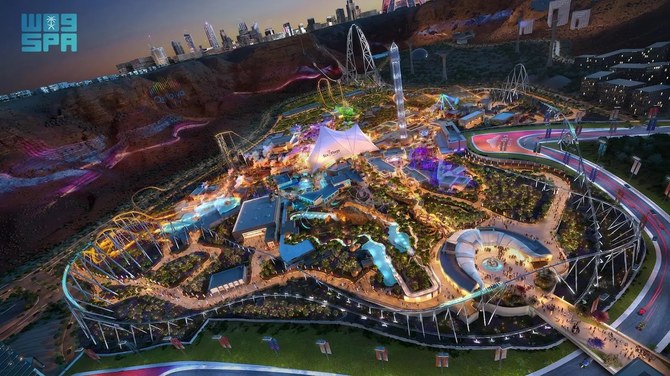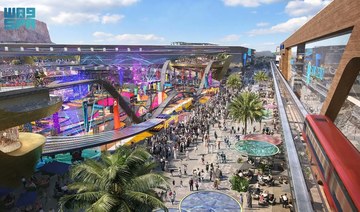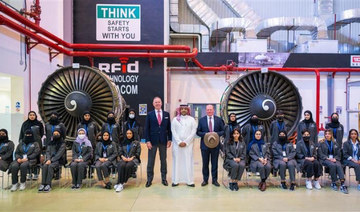JERUSALEM: The first cargo ships from Dubai that docked last year in the Mediterranean port of Haifa were met by celebration in Israel. Flags waved. Reporters gathered. The prime minister walked the pier and gave a speech about the fruits of making peace.
There was zero fanfare, however, when oil tankers began arriving at the smaller Israeli port of Eilat on the Red Sea in an arrangement with Emirati partners. Rather than washing machines and cleaning supplies for consumers, the ships unloaded oil to be transferred through a pipeline across Israel to the Mediterranean.
The companies involved say this land bridge is the shortest, most efficient and cost-effective route to transport oil from the Gulf to the West. But the risks to the environment are far too great, say their opponents who are hoping to end the deal.
About a month after Israel normalized ties with the United Arab Emirates last September, Israel’s state-owned Europe-Asia Pipeline Company (EAPC) announced the new collaboration.
The deal was signed in Abu Dhabi with MED-RED Land Bridge, a company with Emirati and Israeli owners. In attendance was then-US Treasury Secretary Steven Mnuchin.
EAPC’s roots are in the Arabian Gulf. It was first set up as a joint venture between Israel and Iran in 1968 when the two countries were friendly. That partnership collapsed after the 1979 revolution that brought the ayatollahs to power.
The Israeli pipeline still operates in both directions but well below capacity in recent years, energy experts say. With the UAE stepping into the role once held by Iran, EAPC hopes to increase quantities by “tens of millions of tons per year.”
The influx of ships set to dock alongside the fragile coral reefs in Eilat and the large amounts of oil to pass through Israel have outraged the country’s biggest environmental advocates.
Fresh in their minds is an offshore oil spill in February that blackened much of Israel’s Mediterranean coast with tar. And in 2014, one of EAPC’s own pipelines ruptured, spilling 5 million liters of crude oil into a desert nature reserve.
“Most of the details (of the deal) are confidential by law. We know just a little bit, but the little bit makes us very anxious,” said Noa Yayon, head of the legal department at the Society for the Protection of Nature.
Eilat’s coral reef is unique in that it has proved to be more resilient to climate change, when many reefs around the globe are dying. It is also a big tourism draw.
But its proximity to the port means that even the smallest leak from one tankers would cause big, possibly irreversible, damage, Yayon said.
“We are of course very happy with the current geopolitical status with the Arab countries in our area, but we don’t think that it has to come with the super-specific risks to our environment,” she said. “We think that we better promote business with these countries based on clean energy and not oil.”
Minister of Environmental Protection Gila Gamliel last Tuesday sent a letter to Israel’s national security adviser saying “the warning lights are already flashing” and demanded the deal be scrapped.
Too much was decided behind closed doors and remains secret, she said.
EAPC has not made public details of the deal.
“From a rate of six tankers a year, we expect an increase to more than 50 tankers a year docking in Eilat,” Gamliel wrote. “The continuation of this deal will be a tragedy for generations, whether from mishaps that may occur or in a wartime scenario.”
Gamliel is being replaced with the swearing in of the country’s new government, and her successor on Monday called the deal a mistake and said the government should oppose it.
EAPC said the new business is part of its routine operations and that it meets the strictest international standards. Plus, the broader geopolitical gains cannot be ignored.
“Israel is expected to benefit greatly from the agreement, which will strengthen the Israeli economy and its international standing, as well as ensure its energy independence and security,” the company said in a statement.
The Society for the Protection of Nature together with other groups have petitioned Israel’s Supreme Court for a temporary order to freeze the deal. Yayon said the state is due to present its official position in coming days.
The Finance Ministry, which oversees EAPC, declined to comment due to the open court case.
A representative of UAE’s National Holding, which owns Petromal, one of the owners of MED-RED Land Bridge, had no immediate comment on the issue.
The Emirati oil deal that has infuriated Israeli environmentalists
https://arab.news/r7b3f
The Emirati oil deal that has infuriated Israeli environmentalists

- The pipeline was first set up as a joint venture between Israel and Iran in 1968 when the two countries were friendly. That partnership collapsed after the 1979 revolution that brought the ayatollahs to power
PIF’s Alat unveils electrification, AI infrastructure business units

RIYADH: Alat, a flagship company of the Public Investment Fund, unveiled two business units in electrification and AI infrastructure, to establish Saudi Arabia as a premier manufacturing hub globally.
The company unveiled its plans during the Milken Institute Conference held in Los Angeles.
According to a press release, the move comes as part of the PIF company’s strategic vision to spearhead a paradigm shift in industry sustainability while propelling Saudi Arabia on the global stage.
Alat Global CEO Amit Midha said: “I am pleased to announce these two exciting new divisions as they will make a significant contribution to Alat’s overall strategic goal of developing an advanced, sustainable future for the industry.”
The electrification arm will fortify grid technology, catering to the burgeoning demand for electricity driven by exponential growth in renewable energy sources like solar, wind, and hydrogen.
By harnessing Saudi Arabia’s solar energy and other clean resources, the firm seeks to manufacture innovative solutions that will catalyze the global energy transition and drive decarbonization in industry.
The electrification unit will specifically focus on enhancing transmission and distribution technologies, facilitating the integration of renewable energy into existing grids, and pioneering advancements in gas and hydrogen generation and compression technologies.
On the other front, the AI Infrastructure business unit will address the escalating global demand for AI capabilities across industries.
This entails the development of cutting-edge technologies encompassing network and communications equipment, servers, data center networking, storage, industrial edge servers, and Industry 4.0 computing.
“The global electrification market size reached $73.64 billion in 2022 and it is expected to hit around $172.9 billion by 2032, growing at a CAGR of 8.91 percent between 2023 and 2032,” the press release added.
The global AI Infrastructure market is set to hit $460.5 billion by 2033, with a robust 28.3 percent compound annual growth rate, driven by widespread adoption across industries for innovation, decision-making enhancement, and task automation.
As a gold sponsor at the Milken Institute Conference, the firm now has nine business units focused on sustainable technology manufacturing.
“Alat will invest $100 billion by 2030 across these business units to develop key partnerships and build advanced manufacturing capabilities in Saudi Arabia to bring jobs and economic diversification to the Kingdom,” the press release said.
Saudi Arabia’s Qiddiya to build region’s largest water theme park

- Aquarabia will also feature the first underwater adventure trip with diving vehicles
RIYADH: Saudi Arabia Qiddiya Investment Co. will construct the region’s largest water theme park as a cornerstone of its Six Flags Qiddiya City venture it was announced on Monday.
To be named Aquarabia, Qiddiya hopes to draw visitors from around the globe with 22 attractions and water experiences suitable for all family members, as well as some “world-first” attractions, Saudi Press Agency reported.
These attractions include the world’s first double water loop, the tallest water coaster with the highest jump, the longest and highest water racing track, and the tallest water slide.
Aquarabia will also feature the first underwater adventure trip with diving vehicles, catering to adventure enthusiasts with water sports areas designated for rafting, kayaking, canoeing, free solo climbing, and cliff jumping.
Additionally, the park will introduce the first surfing pool in the Kingdom, incorporating immersive design elements themed around ancient desert water springs and Qiddiya’s wildlife.
With sustainability in mind, Aquarabia will implement advanced systems capable of reducing water waste by up to 90 percent and decreasing energy consumption. As part of the Six Flags Qiddiya project, the venture, the first Six Flags of its kind outside North America, aims to recycle operational waste, diverting over 80 percent from landfill.
Scheduled to open in 2025, both Aquarabia and Six Flags Qiddiya City are situated within Qiddiya City, forming a fully walkable neighborhood offering a diverse array of activities, accommodations, dining options, and relaxation spots.
Abdullah Al-Dawood, managing director of Qiddiya Investment Co., hailed the announcement as a significant milestone for Qiddiya and the entertainment, tourism, and sports sectors in the Kingdom.
He emphasized that the projects will cater to diverse entertainment needs while contributing to economic diversification and job creation in the tourism sector.
The project also aims to meet the growing local demand for immersive entertainment experiences, particularly in water activities, aligning with the goals of Saudi Arabia’s Vision 2030 to enhance local tourism and employment opportunities.
The unveiling of Aquarabia follows the announcement of several other entertainment, sports, and cultural attractions in Qiddiya, including the world’s first multi-use gaming and electronic sports area, the multi-sport Prince Mohammed bin Salman Stadium and the Dragon Ball amusement park.
Saudi Arabia ascends as key destination for global talent: BCG report

RIYADH: Saudi Arabia has emerged as a key player in attracting global talent amid ongoing geopolitical shifts and financial uncertainty, moving up two spots on the list of preferred countries for workforce mobility.
The “Decoding Global Talent 2024” report by Boston Consulting Group highlights Saudi Arabia’s rise to the 26th most preferred country, underscoring the success of the Kingdom’s strategic initiatives to position itself as a global hub for professionals.
This fourth edition of the study draws insights from over 150,000 professionals across 188 nations, tracking global talent trends since 2014.
Riyadh’s rise to the 54th rank globally underscores its emergence as a hub of opportunity and progress in the eyes of global talent.
Christopher Daniel, managing director and senior partner at BCG, said: “As the global talent shortage becomes an increasingly pressing challenge for the world's foremost economies, Saudi Arabia is emerging as a pivotal player in narrowing this gap.”
He added: “With a significant proportion of respondents citing the quality of job opportunities, the attractive income, tax, and cost of living, as well as the assurance of safety, stability, and security as key reasons for choosing the Kingdom, it’s evident that Saudi Arabia’s strategic investments in its labor market are bearing fruit.”
Daniel noted that the Kingdom is leveraging labor migration to enhance its workforce, offering a secure and hospitable environment that caters to the diverse needs of international professionals.
“By fostering a job market that is attuned to the evolving aspirations of global talent while prioritizing their well-being, Saudi Arabia is positioning itself as a compelling destination for those seeking growth and fulfillment in their careers,” he said.
Furthermore, the report highlights that younger generations and individuals from rapidly expanding populations are particularly attracted to global mobility, pursuing diverse experiences and opportunities for professional growth.
With 23 percent of global professionals actively pursuing international positions and 63 percent remaining receptive, Saudi Arabia is well-positioned to capitalize on this trend.
The Kingdom offers an enriching environment for a globally oriented workforce to excel and progress in their careers, presenting an enticing option for individuals seeking both personal and professional advancement in an ever more interconnected global landscape.
Riyadh Air to expand fleet with additional aircraft orders, CEO reveals

RIYADH: Saudi Arabia’s Riyadh Air plans to bolster its aircraft lineup through additional orders, as it requires “a very large fleet” to establish itself alongside regional giants, stated the CEO.
This move comes as the Kingdom’s second flag carrier, backed by the country’s Public Investment Fund, ordered 39 Boeing 787-9 jets last year, with options for 33 more.
It also aligns well with Saudi Arabia’s goal to expand its aviation industry and attract more tourists, broadening its airline capacity beyond pilgrimage travel, which currently forms the backbone of the country’s inbound tourism.
“We need a very large fleet, we’re going to make a number of additional orders,” CEO of Riyadh Air, Tony Douglas, said in an interview with Bloomberg Television.
He added: “We will be making a narrowbody order, we’ll probably be doing another large order after that to build us up to scale.”
During the interview, Douglas, who previously led the Abu Dhabi flag carrier Etihad Airways, expressed being “very conscious” of potential delays to aircraft deliveries. This concern arises as both Boeing and Airbus SE grapple with production challenges amidst record demand and supply issues at the two plane makers.
The establishment of a second Saudi national airline alongside the existing flag carrier Saudia is part of the Kingdom’s economic diversification plan.
In November 2023, Douglas expressed confidence in the demand for travel. “We’re not well enough connected. It’s as simple as that,” he said at the time.
The new airline stands to benefit from Saudi Arabia’s rapidly growing economy and the increasing influx of tourists to the Kingdom. Riyadh Air does not intend to pursue mergers and acquisitions to fuel its growth. “No, it’s organic,” Douglas emphasized at the time.
The initial destinations will include major cities in Europe, the US East Coast, and Canada, with the inaugural flight scheduled to depart by June 2025.
By that time, Riyadh Air will have secured slots at major airports, Douglas mentioned, although hubs like London Heathrow are already operating close to capacity.
“It won’t be easy ... but we have no reason to be anything other than confident that we’ll resolve all of that,” he said at the time.
Saudi Arabia and Egypt retain top spots in MENA travel preferences: Wego study

RIYADH: Saudi Arabia and Egypt remain dominant destinations among Middle East and North Africa travelers in 2024, retaining top spots in international preferences, according to a study.
Singapore-based travel booking app Wego ranked Egypt as the top destination for tourists from the region between January and April, followed by the Kingdom, with India consistently holding the third spot since 2016.
Saudi Arabia’s second spot on the wish list is a clear indication of the Kingdom’s progress as a global tourist destination, aligning with its National Tourism Strategy aiming to attract 150 million visitors by 2030.
“We are excited to see Egypt emerge as the leading destination for travelers in the MENA region during Q1 2024. According to Wego's data, Egypt stands out as a favored choice among travelers seeking unique cultural experiences and diverse attractions,” said Mamoun Hmedan, chief business officer at Wego.
He added: “Meanwhile, the United Kingdom retains its position as the preferred European destination for Middle Eastern travelers.”
Among Middle East destinations, the top three — Egypt, Saudi Arabia, and UAE —maintained their positions from 2023. Egypt and the Kingdom, in particular, have consistently held the top two spots since Wego began tracking customer trends over a decade ago.
The study utilized traveler searches and hotel booking data from its website as the foundation for its findings.
The report further revealed that the UAE ranked as the fourth favorite destination, followed by Pakistan, Kuwait, and Turkiye.
Meanwhile, China dropped one spot, reaching the 27th top destination among MENA travelers.
The UK remains the top European destination from the Middle East, holding the first spot for 10 of the last 11 years, briefly overtaken during the pandemic. Italy has notably surged from fourth to second.
Italy, a top global tourist spot, consistently ranks in the top ten European destinations for Middle East travelers.
This year marks Italy’s debut in the top three. Joint investments between Saudi Arabia and Italy in late 2023, along with direct flights by ITA Airways to Riyadh and Jeddah, signify growing ties.
Countries farther from the Gulf region, such as Morocco, Indonesia, and the US experienced the most decline among top destinations.
This trend continued in 2024, with Malaysia, the Philippines, and the US dropping out of the global top 10, while Kuwait, Pakistan, and Jordan, which entered the top ten last year, remain preferred destinations for MENA travelers.
















